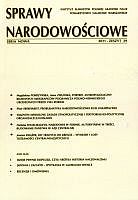Zasady etnopolitycznej i terytorialno–politycznej organizacji Jugosławii. Geneza, ewolucja, współczesne konsekwencje
Principles of ethnopolitical and territorial-political organization of Yugoslavia. Genesis, evolution and contemporary consequences
Author(s): Valentin MihaylovSubject(s): Cultural Essay, Political Essay, Societal Essay
Published by: Instytut Slawistyki Polskiej Akademii Nauk
Keywords: South Slavs; Yugoslavia; ethnopolitical organization; territorial-political organization; ethnopolitics; national self-identification; sovereignty
Summary/Abstract: The subject of the article is the principles of ethnopolitical and territorial-political organization of the Yugoslavian state. The genesis and evolution of mentioned question in the Kingdom of Serbs, Croats and Slovenians (1918-1941) and in Socialist Federation of Yugoslavia (1945-1991) are presented. One of the most important and controversial problems in Yugoslavian ethnopolitics – the relations between its ethnopolitical and territorial-political subsystems are considered. Dynamic changes and a lack of sequence in Yugoslav’s ethnopolitics are emphasized in the paper. Attention has been paid to the question of territorial-political reorganization of the federation at the beginning of 1990s. The groups engaged in the struggle of division of Yugoslavia applied for various principles of delimitation of contentious areas. Susan Woodward brought out four main principles which the antagonist groups use as arguments for their “property right” over the given territory – historical, democratical, principle of the inviolability of borders and realistic one. After the civil war during the 1990s, the Yugoslavian federation was reorganized into the sovereign states by recognizing the old internal administrative borders between the Yugoslav republics as international ones. The author discusses also contemporary problems of the ethnopolitical and territorial-political organization of post-Yugoslav countries and close relations between state-building and nation-building processes. Major current problems in the field of ethnopolitics, as a direct consequence of the influence of accumulated during the 70-year period of existence of a common state, has also been considered in the paper.
Journal: Sprawy Narodowościowe
- Issue Year: 2011
- Issue No: 39
- Page Range: 51-69
- Page Count: 19
- Language: Polish

